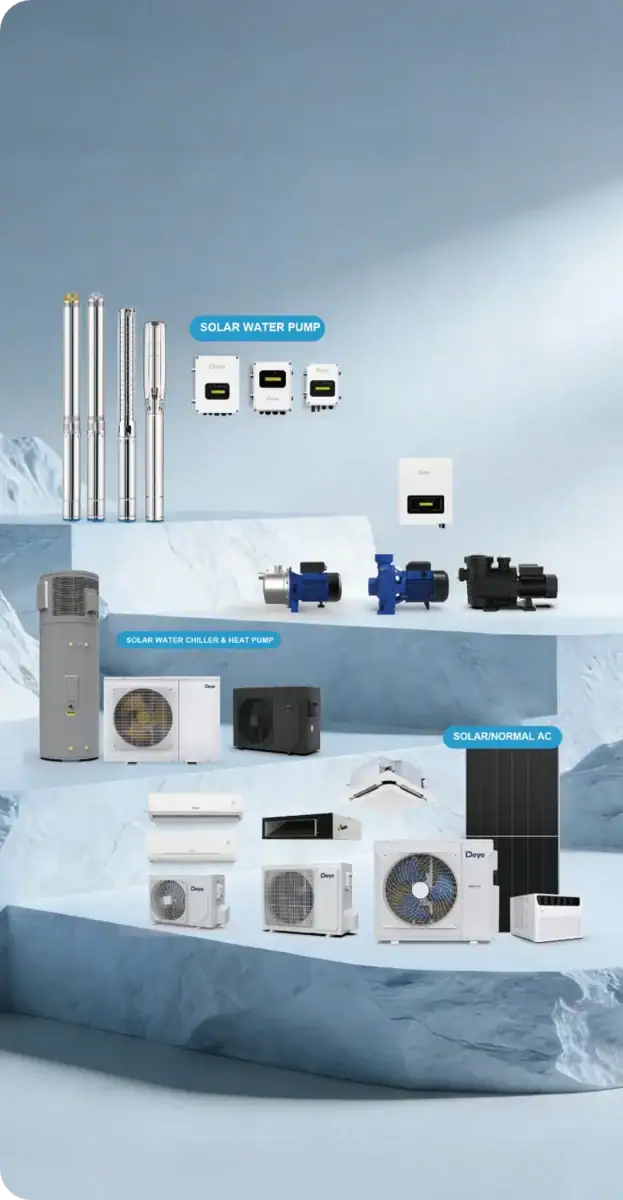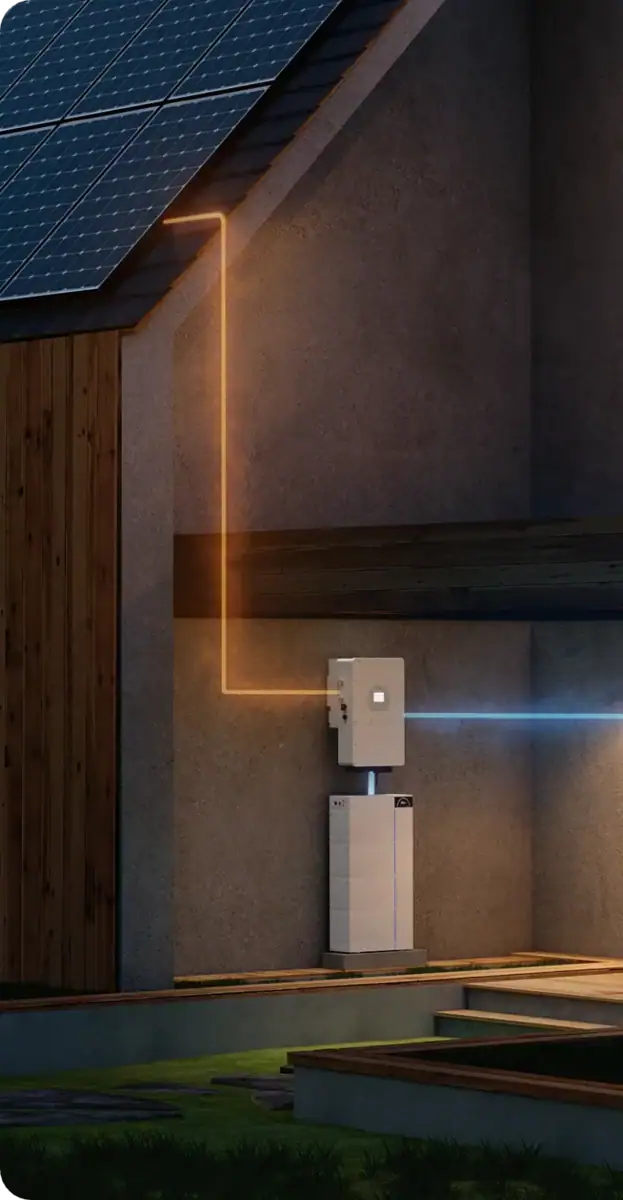Importance of solar batteries
The economic advantages of using solar batteries are clear: the more solar energy you store, the less you’ll need to buy from your utility company. In recent years, however, people have recognized the importance of solar batteries as backup power during prolonged power outages.
With increasingly frequent occurrences of extreme weather revealing the fragility of infrastructure, the solar panel system and battery options have become crucial for those in areas prone to outages.
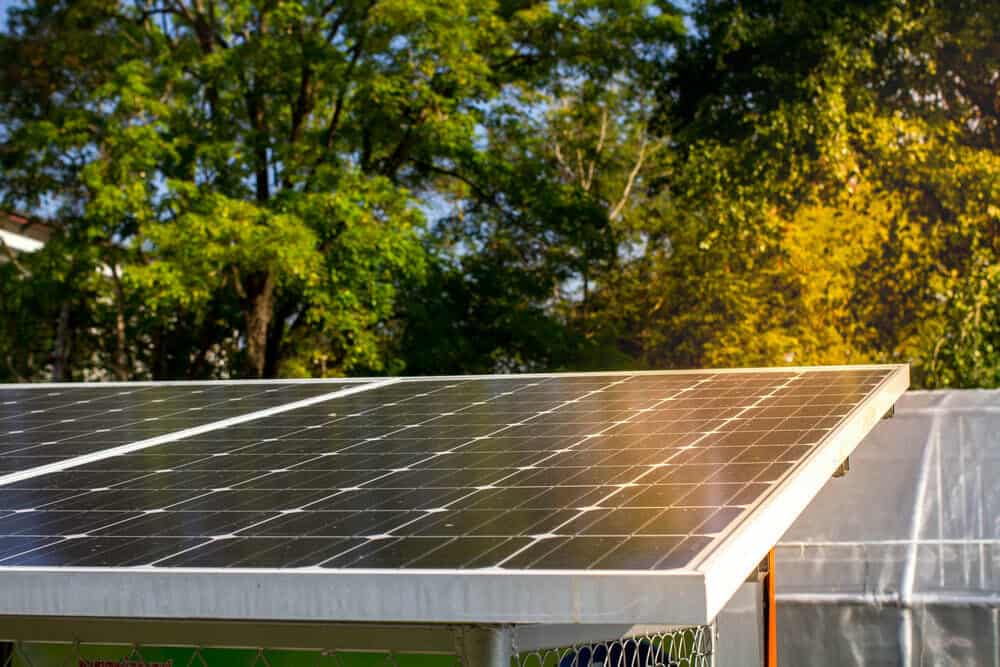
Need for energy storage in solar systems
Why do you need batteries? A solar battery bank is a storage system for solar energy that your system generates instead of feeding it back to the grid so that you can access it later. You can draw from the energy reserves in your solar battery bank during periods when your unit isn’t generating any energy (such as at night or on cloudy days).
How Solar Energy Works
Solar panels absorb energy from the sun and transform it into a direct current (DC) electric current, which then passes through an inverter that converts it into alternating current (AC) electricity, the type that powers homes.
Typically, home solar panel systems are linked to local power grids, which means that any excess energy generated by your solar energy system is directed back to the grid. If your solar installers offer a net metering program, you may receive credits for this extra energy.
Conversely, if your solar system doesn’t produce enough energy to power your home at any given time, you’ll draw electricity from the grid.
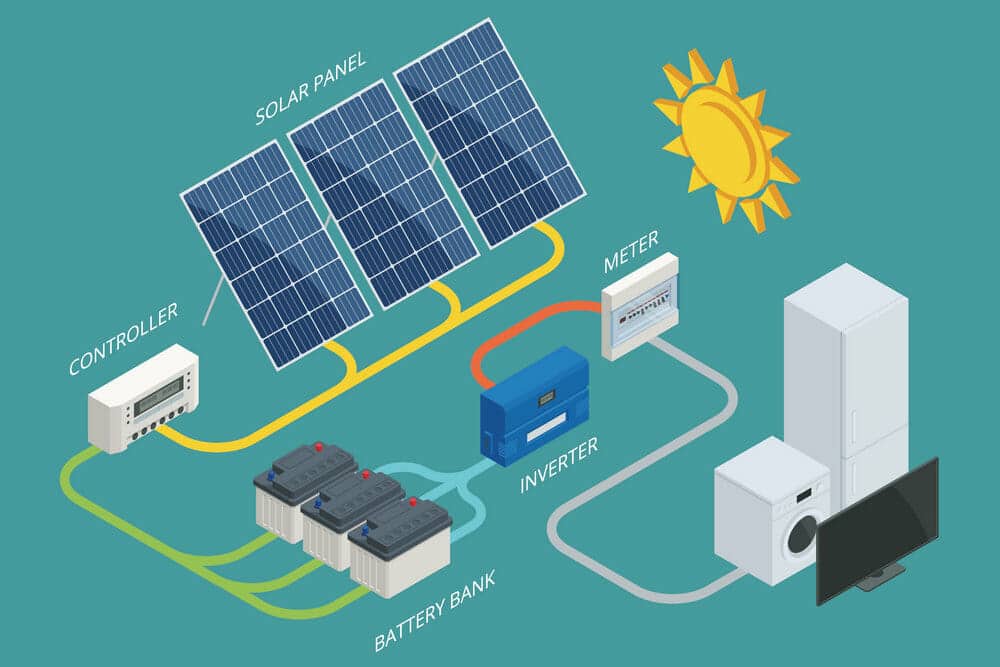
Converting solar energy into electricity
Converting solar energy into electricity involves the use of solar panels. Solar panels consist of photovoltaic cells that absorb sunlight and convert it into a direct (DC) electric current. The DC electricity produced by the solar panels is then passed through an inverter, which converts it into alternating current (AC), which is used in most homes and businesses.
The AC electricity is then used immediately to power appliances and other electrical devices or stored in batteries for later use. The conversion process enables solar energy to be harnessed and utilized as a clean and renewable source of electricity.
Using a Solar Home Battery Bank
Benefits of a battery bank
Solar batteries serve the purpose of storing any surplus energy produced by your solar panels for later use, such as at night, on overcast days, or during power outages. They can be a worthwhile substitute for a net-metering program, which compensates customers for selling extra energy back to their utility company. Opting out of a solar battery means you’re forfeiting the opportunity to obtain extra long-term savings on energy.
Storage and usage of solar energy
Solar power can be stored and used in various ways. One standard method is using solar batteries, which store excess solar energy generated during the day for later use at night or on cloudy days. This enables homeowners to reduce their reliance on the grid and save money on energy bills.
Another way to store solar energy is through thermal storage, which involves using a solar thermal system to capture and store heat energy from the sun. This stored heat can be used for space heating, hot water, and other applications.
Regarding usage, solar energy can also be used directly as it’s generated. This is achieved through grid-tied solar systems connected to the local power grid, allowing homeowners to use solar energy during the day while still drawing electricity from the grid as needed. Excess energy generated by the solar system can be fed back into the grid and credited to the homeowner’s account through net metering programs.
On the other hand, off-grid solar systems are not connected to the grid and require battery storage to provide power when the sun is not shining. These systems are often used in remote areas or for emergency backup power.
Types of Solar Batteries
- Lithium-Ion Batteries
Lithium-ion batteries are popular solar batteries used for solar panels today. Initially designed for electric vehicle (EV) batteries, the solar industry recognized the potential of advanced lithium-ion technology for home energy storage. Lithium-ion battery is desirable due to it’s high density, deep depth of discharge (DoD), and extended lifespan.
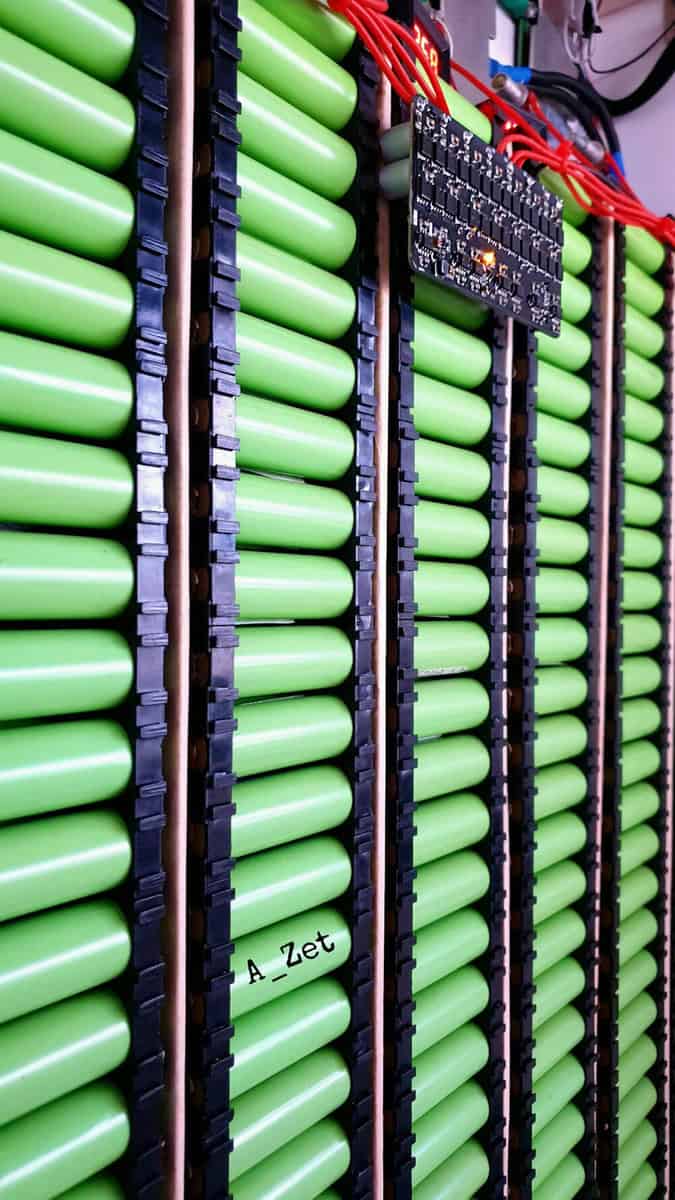
All of the top solar batteries on our list incorporate some variation of lithium-ion technology. It’s worth mentioning that lithium iron phosphate batteries are a subtype of lithium-ion technology.
- Lead-Acid Batteries
Lead-acid batteries are standard rechargeable batteries. This technology has been utilized for centuries. However, lead-acid batteries offer fewer advantages due to their low density, shorter lifespan, low power rating and slow charging capabilities than their lithium counterparts.
There are various types of lead-acid batteries, including AGM (absorbent glass mat) batteries, sealed lead-acid batteries, flooded lead-acid batteries, and deep cycle batteries.
- Flow Batteries
Flow batteries represent a promising emerging technology that has the potential to compete with lithium batteries someday. When powered by solar panels, a chemical reaction occurs within an electrolyte fluid in flow batteries, generating an energy flow between two chambers inside the battery.
The advantages of flow batteries include their 100% depth of discharge (DoD), relative simplicity, and the necessity of fewer rare metals. Despite their potential, flow batteries are in the developmental phase and are too big for household applications.
How to Choose the Best Solar Battery
Here are some critical factors to consider when searching for the best solar batteries for your residence.
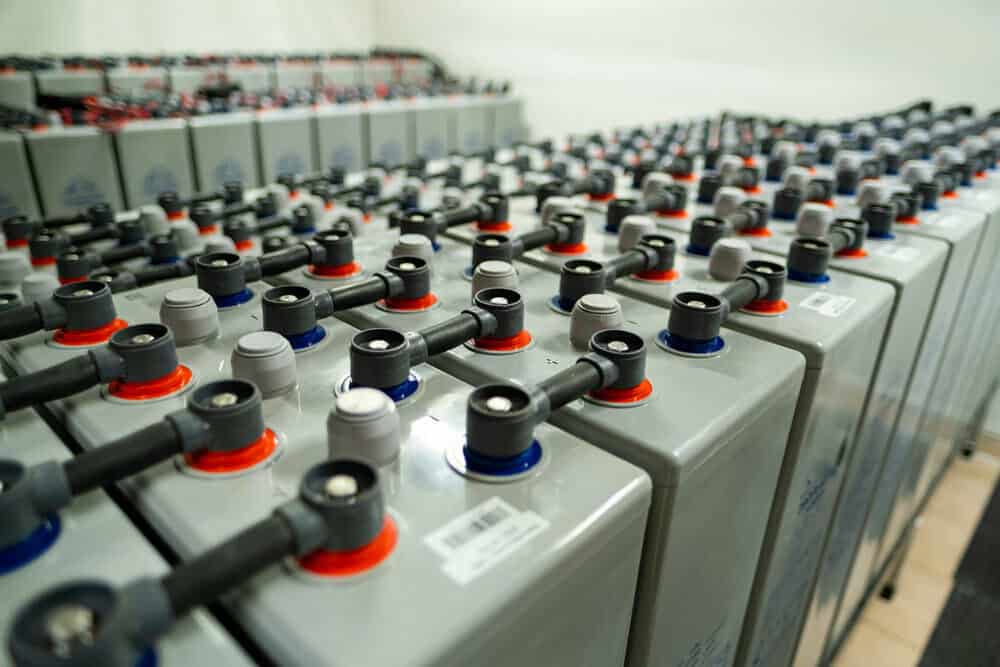
Battery Capacity
Battery’s capacity denotes the maximum amount of electricity it can store and is usually measured in kilowatt-hours (kWh). It’s important to note that many solar batteries are modular, which means you can combine multiple batteries to increase their overall storage capacity and amount of battery’s stored energy.
Power Rating
The power rating indicates the electricity the battery can supply at a given time and is usually measured in kilowatts (kW). It’s important to differentiate between high power rating and continuous power rating, with continuous power rating being more significant as it represents the power the battery can provide over time.
Depth of Discharge
The depth of discharge (DoD) is another crucial factor when selecting a solar battery. DoD indicates the minimum charge level the battery should always maintain based on its chemical composition.
A battery with a higher DoD sonnen eco batteries allows you to utilize more of the energy storage system’s total capacity, making it a better choice in most cases.
Round-Trip Efficiency
The efficiency of a battery bank is measured by its round-trip efficiency, which refers to the amount of energy fed into the battery that can then be used.
On average, solar storms have a round-trip efficiency of 80%, which means that 20% of the energy fed to the battery by the solar panels is lost during the process. A higher round-trip efficiency is desirable, and all the batteries on our list above have a round-trip efficiency of at least 90%.
Price and Warranty
The price point is understandably a primary concern when investing in solar equipment. However, it’s essential to remember that you should be looking for value rather than simply the lowest cost.
Battery costs are just one factor, as different batteries have varying life cycles and associated costs. Opting for a less expensive, less powerful battery may not be the most cost-effective solution in the long term.
Another factor to consider is warranty. Most solar panel batteries have contracts guaranteeing several cycles or years. When deciding, it’s essential to balance the warranty against the price point, as it can significantly impact the overall value.
Recommended Battery for Energy Storage System
100ah SOLAR BATTERY
The 100ah solar battery has the following descriptions and advantages:
- Easy Installation
The 19-inch embedded design module allows for quick and convenient installation and maintenance.
- Reliable and Safe
The cathode material is made from LiFePO4, ensuring safety and long cycle life. The module also has a low self-discharge rate, allowing it to be stored for up to 6 months without charging and no memory effect. Additionally, it performs well with shallow charge and discharge cycles.
- Intelligent Battery Management System (BMS)
The module features a BMS with protective functions such as over-discharge, over-charge, over-current, and over-temperature. The system can automatically manage the charge and discharge state while balancing the current and voltage of each cell.
- Environmentally Friendly
The entire module is non-toxic, non-polluting, and environmentally friendly.
- Flexible Configuration
Multiple battery modules can be connected in parallel to expand capacity and power. The module supports USB, WiFi (optional), and remote upgrades (compatible with the Deye inverter).
- Wide Operating Temperature Range
The module performs well in a wide range of temperatures, from -20°C to 55°C, with excellent discharge performance and cycle life.
GB-SCL-ALL IN ONE
- The ALL IN ONE PLUS is a comprehensive solution that combines optical storage and charging functionalities, providing a convenient one-stop service.
- It offers maximum output with 100% unbalanced output for each phase and up to 50% rated power.
- The system can support up to 10 parallel connections for on-grid and off-grid operation, and can also store energy from diesel generators.
- The high-voltage stack design eliminates the need for cable connections, improving the overall efficiency of the system.
- The system features thermal management that includes temperature detection of key parts, cells, and power plug-ins.
- It can operate in a wide temperature range, and an optional heating function is available for low-temperature scenarios where temperature sensing is not required.
AI-W5.1-ESS (LV)
- The Energy Storage System with an All-in-one design integrates a hybrid inverter and battery of 5/8/12KW.
- It’s easy to control through the App, PC, or Touch-Display, providing smart applications such as peak-shaving, smart load, and AC couple.
- The modular lithium iron phosphate battery has a scalable capacity of 5kWh to 30kWh, ensuring safety.
- With a flat and stackable design, the system can be floor or wall-mounted without wiring or extra fixing screws, ensuring quick and easy installation.
- The system has a fast switching time of 4ms, ensuring energy security.
- It’s also off-grid capable and supports diesel/gas/LNG generators for off-grid buildings.
Frequently Asked Questions
Do I even need a solar battery?
While it’s not technically necessary to have a solar battery backup system, it’s highly recommended. Solar panels convert solar energy into electricity, which is then stored in the battery bank.
The larger the battery bank, the more power will be available as backup when solar energy is not available. The growing instances of extreme weather and power outages have highlighted the importance of developing reliable sources of backup power.
How long do most solar batteries last?
On average, solar batteries have a usable capacity of five to 15 years. This implies that you will likely need to replace your battery at least once during the lengthy battery life of your solar panels, which generally last for 25 to 30 years.
How can I extend the lifespan of my solar battery?
Protecting your solar battery from extreme temperature drops can help to prolong its life. You can achieve this by choosing a battery that comes with built-in temperature moderation, such as the Tesla battery, or by installing earth-sheltered enclosures for your solar panel battery bank.
How many solar batteries do I need?
The number of batteries needed for a solar energy storage system can differ from household to household, depending on the amount of energy required and the capacity of each battery. Typically, a higher-capacity battery means fewer total batteries are needed. For a more personalized evaluation, it is recommended to consult with a solar installer.
How do I install a solar battery?
Most of the top solar companies offer battery setup along with solar panel installation, but not all. If you are purchasing solar panels, it’s recommended to inquire about battery add-ons from your installer.
For those with existing solar systems, it’s possible to retrofit them with new battery technology by either hiring a separate company to install batteries or researching and doing it yourself.
Importance of selecting the right solar battery
Selecting the correct solar battery is crucial for maximizing the benefits of a solar energy system.
A well-suited solar battery can provide reliable backup power during outages, store excess solar energy for use during peak demand times, and extend the system’s overall lifespan. The correct solar battery should have the appropriate capacity, longevity, temperature moderation, and compatibility with the solar energy system.
Careful consideration of these factors can ensure optimal performance, cost savings, and energy resilience, making the selection of the correct solar battery a critical decision for homeowners and businesses alike. Making informed decisions for optimal solar energy storage
To maximize the benefits of solar energy, selecting the right solar battery is essential. The correct battery will ensure that the energy captured by your solar panels is stored efficiently and available when you need it. Factors such as battery capacity, warranty, and performance in extreme temperatures should be considered when selecting a solar battery.







